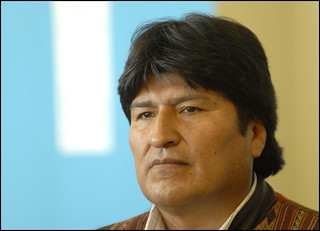
Foto: Alain Bachellier
It’s the question on the mind of almost every student sitting in almost every class in American high schools. The way we, and they, answer this question has a lot to do with how, and when, and where our students will be successful in their future:
What is the big deal?
Who cares about the derivative? Who cares about grammatical mood? Who cares about some book some woman wrote a long time ago with phrases like “How much sooner one tires of any thing than of a book!”? Really, someone tell us, what is the big deal?
For a long time, in my class I’ve tried to design my curriculum so heavily around themes and authentic sources that the culture and its cares and hopes have been infused into almost everything we do, and this has brought us to a concept we call the RBD: the Really Big Deal. For us, it’s the answer to the big question. What’s the big deal about Spanish? Here are some RBD concepts in our class:
- A president died of cancer and his successor accused the United States of giving it to him. The ensuing election brought a dictatorship closer than ever to real freedom of speech and press and democracy, but the successor was elected in the end. Why? How? This is a really big deal.
- The Spanish “found” the New World and declared it was theirs. They found people who sacrificed live humans to their gods and lived mostly from battle to battle so they decided these people would be better off with the Spanish God and only people with Spanish blood go to heaven anyway, so they tortured and infected and raped and slaughtered them. Five hundred years later the Pope doesn’t think this is a big deal but a couple of Latin American presidents do, one so much he declares Columbus Day the “Day of Indigenous Resistance” and proclaims that before the Spaniards showed up, there were no boundaries or divisions among the indigenous (really?!). What does this mean for, say, racism in Latin America? How people worship? Holidays they celebrate? This is a really big deal.
- The tourist has the Almighty Dollar and sometimes countries and people groups will sacrifice important physical and cultural resources to get more of it. But others believe that sustainable tourism is not only possible but can better showcase what these countries and people groups are really like. This is a really big deal.
- Sometimes illegal immigrants break the law and cross a border because the alternative is watching their children starve and somehow a mere law doesn’t seem that important anymore. But they live in fear of being sent back where they came from so while they’re working hard and getting stared at and yelled at and insulted because you can’t understand them talking to their kids in Walmart, they’re afraid of contacting the police about crime and they don’t know what urgent care is, much less that it’s much cheaper than the emergency room. What would you do? How can you make a difference for them? This is a really big deal.
Ok, so we have a lot of RBDs in world language class. But teenagers are notoriously self-oriented. How do we make the RBD part of their world? Some ideas:
- Make yourself aware. Set aside a little time each day or week to watch or read the news from the TL culture.
- Get students working with authentic resources. When students are exposed to how the TL culture lives, then you can ask for…
- Comparisons. This is a huge AP goal. Get students comparing their world with others – and not just how they’re different. How are they the same?
- Put students in the situation. One of my interpersonal assessments is that I pose as the mother of an undocumented child who needs a vaccine and can’t get it at the doctor’s office because it’s too expensive. One student is the receptionist who speaks English, and the student being assessed has to negotiate between me and the receptionist and then give me information about the local health department.
- Create the debate. There is no easy answer to the Spanish conquest vs. indigenous debate. Both sides were unbelievably brutal. It was a brutal time. Don’t be afraid of the difficult questions. These things really matter and it’s time for students to think about them.
- Give students a platform. Sometimes you will have a student that really buys into a RBD. How can you give them a voice? Where can you channel their efforts to make a difference? How can you help their enthusiasm be contagious?
Remember, school should be about life, and that is a really big deal.
1 Comments
Comments are closed.




[…] Driving Questions have to be both open-ended and provocative. The trouble in a novice language class, of course, is finding a topic that a novice can handle, a […]